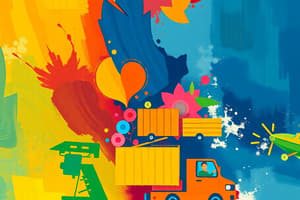Podcast
Questions and Answers
What is the primary purpose of SMED in lean supply chain management?
What is the primary purpose of SMED in lean supply chain management?
- To eliminate human error in processes
- To ensure high batch production
- To reduce production costs
- To minimize setup times to single minutes (correct)
What does Kaizen represent in lean manufacturing?
What does Kaizen represent in lean manufacturing?
- A tool for visual management
- A philosophy of teamwork
- Continuous small improvements (correct)
- A method of changeover optimization
Which of the following best defines Poka Yoke?
Which of the following best defines Poka Yoke?
- A mistake-proofing approach to eliminate defects (correct)
- A technique for cost reduction in manufacturing
- A method to encourage team collaboration
- A strategy to measure process performance
What is a visual workplace primarily designed for?
What is a visual workplace primarily designed for?
How does the process chart contribute to lean management?
How does the process chart contribute to lean management?
What key benefit does team-based continuous improvement provide in manufacturing?
What key benefit does team-based continuous improvement provide in manufacturing?
Why is it important to utilize digital photography in creating process charts?
Why is it important to utilize digital photography in creating process charts?
What is a common misconception about Lean tools?
What is a common misconception about Lean tools?
What does the Japanese word 'Kanban' literally mean?
What does the Japanese word 'Kanban' literally mean?
Which of the following is NOT a major element of the Kanban system?
Which of the following is NOT a major element of the Kanban system?
What type of system is Kanban classified as?
What type of system is Kanban classified as?
Which of the following information is typically NOT provided on a Kanban card?
Which of the following information is typically NOT provided on a Kanban card?
The Kanban work system was originally developed at which company?
The Kanban work system was originally developed at which company?
What is the main purpose of a Kanban card in the Kanban system?
What is the main purpose of a Kanban card in the Kanban system?
In the Single-Card Kanban System, where do 'empty containers' belong?
In the Single-Card Kanban System, where do 'empty containers' belong?
Which of the following is a benefit of using a visual tool like Kanban?
Which of the following is a benefit of using a visual tool like Kanban?
What does a typical Kanban card include in terms of customer information?
What does a typical Kanban card include in terms of customer information?
Which aspect of standardized work does NOT contribute to improving efficiency?
Which aspect of standardized work does NOT contribute to improving efficiency?
In Kanban terminology, what does the action 'pull' refer to?
In Kanban terminology, what does the action 'pull' refer to?
How does a typical Kanban system maintain flow in production?
How does a typical Kanban system maintain flow in production?
What additional location information does a Kanban card provide?
What additional location information does a Kanban card provide?
In a Kanban system, what does an 'assembly line' generally refer to?
In a Kanban system, what does an 'assembly line' generally refer to?
Flashcards
Lean Supply Chain Management II
Lean Supply Chain Management II
A course focusing on Lean principles applied to supply chains.
House of Lean
House of Lean
A framework for implementing Lean principles and practices.
Kaizen
Kaizen
Continuous improvement through small, incremental changes.
Poka-Yoke
Poka-Yoke
Signup and view all the flashcards
SMED (Single Minute Exchange of Die)
SMED (Single Minute Exchange of Die)
Signup and view all the flashcards
Process Chart
Process Chart
Signup and view all the flashcards
Visual Workplace
Visual Workplace
Signup and view all the flashcards
Kanban
Kanban
Signup and view all the flashcards
Pull System
Pull System
Signup and view all the flashcards
Kanban Card
Kanban Card
Signup and view all the flashcards
Single-Card Kanban System
Single-Card Kanban System
Signup and view all the flashcards
Visual Tracking
Visual Tracking
Signup and view all the flashcards
Standardized Work
Standardized Work
Signup and view all the flashcards
Kanban meaning
Kanban meaning
Signup and view all the flashcards
Kanban elements to consider
Kanban elements to consider
Signup and view all the flashcards
Kanban Card Information
Kanban Card Information
Signup and view all the flashcards
Study Notes
Lean Supply Chain Management II
- Course offered by Dr. Melisa Özbiltekin Pala
- Key topics include reminders for project deadlines including:
- October 15, 2024: Deadline for selecting project topic (email submission)
- October 22, 2024: 10-minute presentation on chosen project topic
- November 12, 2024: Interim report presentations, report upload to Moodle
- December 24, 31, & January 7, 2025: Final project presentations
House of Lean
- A visual representation of lean enterprise components
- Highlights key lean concepts and tools
- Depicts the flow of work with value stream mapping, standardized work, and 5S
- Shows how the concepts integrate to create a holistic approach
Lean Tools: Kaizen
- Small, continuous improvements ("kai" = little, "zen" = better)
- Focus on improving processes continuously
- World-class manufacturing outcomes
- Six-step cycle includes:
- Identifying problems
- Analyzing current processes
- Testing solutions
- Creating solutions
- Standardizing the solution
- Documenting standard work flows
Lean Tools: Poka-yoke
- Mistake-proofing strategies
- Eliminates human error by preventing defects
- Defects never get to customers
- Visual aids and methods are used to prevent mistakes.
Lean Tools: SMED
- Single Minute Exchange of Die (SMED)
- Aims to reduce setup times to minutes
- Enables high-frequency changeovers
- Continuous improvement, team-based processes
- Keep reducing changeover time and cost for smaller batches
Lean Tools: Process Chart
- Documents work steps visually
- Used for process improvement within teams
- Captures process data, such as time taken and distances
Lean Tools: Visual Workplace
- Fundamental element in Lean
- Systems to share information at-a-glance, eliminating the need for verbal communication
- Important for ease of access, quick understanding, feedback
Lean Tools: Kanban
- Japanese word meaning "card" or "sign"
- A pull system for visual process & project management
- Manufacturing engineers at Toyota were behind its development over 60 years ago
- Kanban visualizes and manages flow and communication
What Kanban Does
- Main components include:
- Defining what to pull
- Deciding when to pull items
- Determining how much to pull
- Specifying where to pull items from/to
A Typical Kanban Card
- Includes information such as:
- Supplier name and stocking location
- Part information (ID, quantity)
- Customer information (storage location, group location)
- Kanban number
The Single-Card Kanban System
- A flow diagram of the receiving post, fabrication cell, and storage area for both Kanban products.
Lean Tools: Standardized Work
- Refers to standardizing best work practices
- Makes work safe and repeatable, with limited variation for high productivity
- It is the optimal combination of employees, equipment, materials, and procedures
Simple Calculations and Terms about Lean Times (Value Stream Mapping Metrics)
- Cycle Time: Time to complete a single unit
- Takt Time: Time between completing one unit and beginning the next
- Lead Time: Covers the entire order fulfillment process, from placement to delivery
- Throughput Time: Time for goods to go through the production process
Lead Time vs Cycle Time
- Lead time considers all steps, including those outside of internal production
- Cycle time is the elapsed time for the internal steps
Takt Time, Cycle Time, and Lead Time
- Calculation example and figures are included in the text
Studying That Suits You
Use AI to generate personalized quizzes and flashcards to suit your learning preferences.




